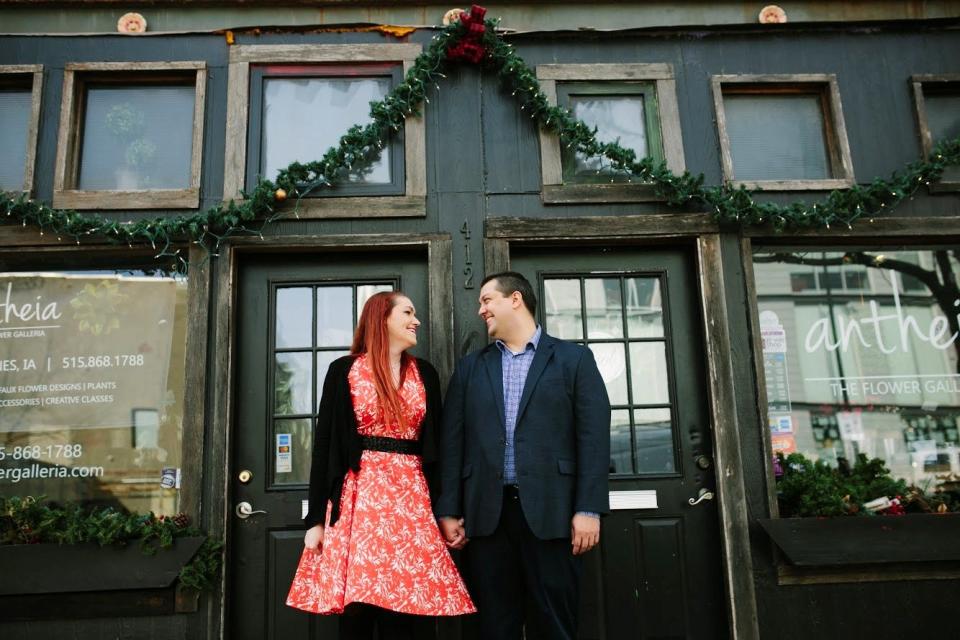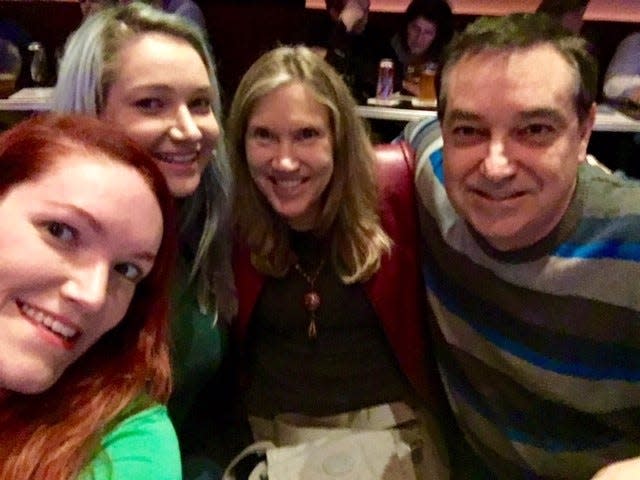My tailor said I had 2 months to lose weight for my wedding. She didn't know I was anorexic.
I had two months to …
The tailor let the sentence linger in the air for way too long as I stared in the mirror looking at myself in a wedding dress.
What she couldn't bring herself to say (or edited out before it was too late) was that I had two months to lose weight.
This gown didn't look like the dress I fell in love with when I tried on a sample size months earlier. My bellybutton showed through the fabric.
The well-placed ruching designed to cover my stomach only highlighted every lump. And my thighs sprang out of the bodice like overstuffed egg rolls.
By some miracle, I was able to hold my composure as she poked and prodded and loosened and tightened. When I reached my car, I cried so hard the storefronts of Grand Avenue started to resemble a Matisse painting.
Telling any bride to lose weight while she is wearing a wedding dress is awkward at best and certainly not good business practice.
But to say this to me — a recovering anorexic — was nothing short of devastating.
Getting clothes from the husky girls' section
I was overweight most of my childhood.
I bought my clothes from the husky girls' section and endured the horrors of gym class. In middle school, my weight jumped to the high edge of the pediatrician's chart.
My parents, no doubt acting on information from the pediatrician, attempted every way imaginable to get me to lose weight.
Every snack in my house was swapped for rice cakes or, on rare occasion, some Snackwell’s brand “cookie” substitute. My suite of arts-related activities was supplemented with abhorred soccer, swimming and gymnastics.
More: I thought sexual abuse only happened to other people's children. Then I woke up.
As a teen, I would have welcomed gay conversion therapy. Thankfully, I dodged that trauma.
A fraternity hazing ritual killed our son. Now, we're making sense of his senseless death.
But it was the quiet, almost subliminal message — "I wasn't good enough" — that burrowed insidiously deep. The hushed conversations. The exchanged looks when I ordered.
Once, on an evening out during our annual family beach vacation, the time came for dessert. Lots of people around the table ordered — it was vacation, after all — so I chose a slice of key lime pie.
A few bites in, my dad asked for a taste. He didn't take one, instead quietly handing the half-eaten pie to the waitress. We’ve never talked about that moment, and I'm not sure he knows I noticed.
But I started high school, went through a growth spurt, got my period and somehow started shedding weight. Boys paid attention to me.
Parents’ friends commented on how good I looked. A new world of clothes suddenly became available.
With the wind finally at my back, I started working out and restricting my eating. If I’d lost weight by basically existing, what could happen when I really focused on it?
Turns out a lot.
When sugar became my enemy
I remember eating a slice of cake on Sept. 5, my birthday, just after starting my junior year of high school. I was working out then but still eating fairly normally.
The sugar hitting my tongue with each morsel was supposed to feel like a treat — like it had on every other birthday. But this time, each bite felt like a burden. This one infraction, my guilty mind reasoned, meant more gym and less food.
That slice marked the last time I'd eat sugar for at least a year.
Over the fall and into the winter, I ate 400 calories a day. Each stick of gum was counted. Every sip of black coffee monitored.

Any day I couldn’t work out was devastating. Instead of walking anywhere, I ran everywhere. Instead of sitting, I stood.
Unbeknownst to me, a coalition of teachers told my parents there was an issue. They already knew and were working on what to do next.
As snow melted, I was made to go to the doctor’s office every week to weigh in. In preparation, I would put full soda cans in my over-sized sweater and shove random objects into my boots or my bra or my pants in a feeble attempt to weigh myself down.
"If I fool them, they might just leave me alone," I thought.
I remember weighing myself one night and seeing the number 95 light up the scale. I was 16 and about 5-foot-7, the same height I am now.
“You’re almost good enough," I told myself.
Everyone in my orbit seemed upset and worried, but I was just becoming what they’d always asked of me: thin.
Taking stock of the things I lost
After about a month with no change in my weight, I wasn’t allowed to eat alone. The doctors and my parents knew I had been lying about what I was and wasn’t consuming.
So I preyed on people I could control, like my sister, a grade-schooler seven years my junior.

Looking back, I know she knew what I was doing. But I felt so sure that if I coached her on what to say I had eaten — a burrito with extra cheese, chips and guacamole — no one would be the wiser.
Each time, she dutifully reported what I said, but her eyes betrayed how scared she was for the sister she saw fading away.
One night after another faked meal, she wrote a note to my parents. She told them that she had been lying to them, and that I wasn’t eating when we went to dinner together.
Finally, as early flowers bloomed, I was pulled out of school and sent to a hospital.
There, I was one of several forced to eat in front of the staff, to use the bathroom and not flush (just in case you had perfected the art of silently throwing up) and to sit in various therapies for hours at a time.
The first week I was in all-day out-patient care, my dad took my little sister to Florida. My mom listened to me cry about butter and bread and cheese and all the things they made me eat that day or sat there quietly absorbing as I screamed at her for ruining my life.
After months of little progress in out-patient care, a more permanent in-patient option was being seriously discussed. The move felt inevitable.
Until one day, when I decided to participate in theater therapy.
The scheduled activity was to take turns hitting a bean bag with a baseball bat and yelling out everything that upset us that week.
When my turn came, I found myself wailing as I enumerated what I lost, and who I hurt, as this disease took hold.
My car. That trip to Europe I saved for. My job. My part in the school play. My friends. School. Family. My sister.
My life.
Something clicked in that moment, and the message everyone had desperately been trying to deliver finally became clear: If I continued down this path, I would die.
Recovery was slow and steady, but I got to leave the hospital with a little bit of summer remaining. That September, I started school with my class.
When my birthday came around, I had my first slice of cake for a long time. And I savored every granule of sugar hitting my tongue.
Climbing out of the black hole
Standing in a wedding dress, my eyes darting over every flaw I saw in the mirror, I understand the tailor knew none of this when she told me that I had two months to lose weight.
She didn’t know that it could cause me to slip back into old ways of counting calories and denying myself, well, everything.
There’s this dizzy feeling people get when they don’t eat. For the average person, it’s equated with sickness.
For those recovering from eating disorders, it’s a kind of high: Floating above yourself in some way, you feel like you are finally in control of something — anything — in your life.
But that’s the lie the disease tunnels into your mind. You aren’t in control; you’re at the whims of a parasite that has latched on and won’t let go.
This time I have been able to hover above anorexia’s black hole.
A lot of that credit goes to my fiance, who tells me I'm beautiful whenever he can, but, more importantly, tells me I'm smart and hardworking and fun and worthy of goodness.

Some credit goes to me, too. I am stronger than I was before. I have purpose; I love what I do and I am excited about what's next.
Taken together, those work like a shuttle’s jet engines propelling me away from danger.
But the black hole’s gravitational pull is strong.
Never do I look in the mirror and say, “You look great.” Most often, I see myself and think, “You look like a cow.”
A number on a tag doesn't determine my worth
My family and I are closer than ever now. My sister is my maid of honor and the most empathetic person I know.
I hold no ill-will toward my parents for either the Snackwells or the hospital; everyone was just trying to do their best in a tough situation.
I wish I could tell you exactly how I got over allowing these feelings about myself to take hold. But like all mental illnesses, there is no magic pill.
It’s a struggle and it always will be. For me, some portion of my brain will constantly be working on keeping habits and thoughts at bay.
But the salve I can offer is to surround yourself with people who care about you. People who know how to say the right thing at the right time. And people who value you for every reason other than what you look like.
Most of the two months I had have come and gone, and I am not sure that I lost any weight.
But I have come to love my wedding dress and the way it hugs my curves. I remind myself daily that smaller doesn’t equal more beautiful and that a number on a tag doesn’t determine my worth.
I’ll debut my wedding dress Dec. 29, and I can’t wait to rock that walk down the aisle.
After we say vows and dance for hours, I plan to cozy up to the dessert table.
I’ll scan the options, but, really, there’s only one way to properly mark this new outlook: a big slice of cake.
Courtney Crowder is the Iowa Columnist for the Des Moines Register, where this column originally appeared. You can contact her at (515) 284-8360 or ccrowder@dmreg.com. Follow her on Twitter @courtneycare.
This article originally appeared on Des Moines Register: My tailor said I had 2 months to lose weight for my wedding. She didn't know I was anorexic.

